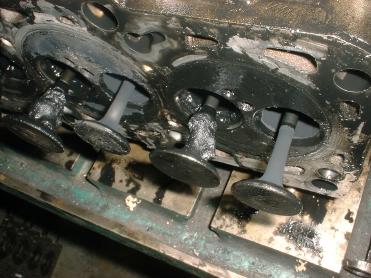leaking plenum clogs cats?
#1
so i know the plenum can clogs cats but on my truck my cat is gutted out so it has no whatever was in it from the factory.... so since i don't have a cat to clog could my muffler get clogged from the leaking plenum?
i ask this because my truck seems to be quieter than it was when i had the flowmaster muffler put in 1.5 years ago....
i ask this because my truck seems to be quieter than it was when i had the flowmaster muffler put in 1.5 years ago....
#2
doubtful. The catalyst in the cat has holes just a few millimeters in diameter whereas your mufflers internal passages are more likely several inches in diameter. You'd have to be blowing serious chunks out of your engine in order to clog the muffler in only 1.5 years I would think.
Maybe the loud muffler is causing you to go deaf and so it only seems quieter now.
Maybe the loud muffler is causing you to go deaf and so it only seems quieter now.

#3
#4
The greater concern if you've got a blown plenum gasket is the carbon that's not getting as far as your exhaust system. It's forming solid masses of baked on crap on your valve stems, piston domes, and combustion chambers. It's stretching your valves and causing valve leaks, and the finest particles of it are blowing past your rings so the engine oil can carry it to bearing surfaces. It's turning your motor oil acid, etching away at things that should be polished smooth.
If its compromised, fix the damned gasket.
#5
Mufflers with no cats ahead of them will develop carbon deposits, no question. Back in the day before catalytic converters were invented we used to see soot and sticky carbon falling out of compromised mufflers all the time. It wasn't all that uncommon for such an abused muffler to come apart -- usually it just got loud after blowing out chunks of rusty metal and clods of carbon, but every now and then those chunks would choke off the exhaust and put the engine at risk.
The greater concern if you've got a blown plenum gasket is the carbon that's not getting as far as your exhaust system. It's forming solid masses of baked on crap on your valve stems, piston domes, and combustion chambers. It's stretching your valves and causing valve leaks, and the finest particles of it are blowing past your rings so the engine oil can carry it to bearing surfaces. It's turning your motor oil acid, etching away at things that should be polished smooth.
#7
Trending Topics
#9
The biggest concern I'd have would be the valve stems. The piston domes can be fairly carboned up without causing problems, and just waiting for all of the cool chemicals to do their thing is not a bad approach. But if you've had a leaking plenum for quite a while, you'll have significant buildup of carbon on the intake valve stems, and that buildup will cause them to overheat, and the carbon will be interfering at the valve guides. This will cause sticking valves and valve stem stretch and may cause catastrophic failure of the valve.
Courtesy of aa1car.com, a nice photo of the thing I'm talking about:

Mmmm... fudgesicle intake valves! Yummy. Though caused by leaky valve stem seals in the above photo, it's exactly that kind of thing that goes on when the plenum is sucking oil into the intake stream. Same problem, different source.
First things first: Fix that blown plenum gasket. It'll do a lot more damage than just fouling a catalytic converter and ruining your fuel efficiency!
#10




